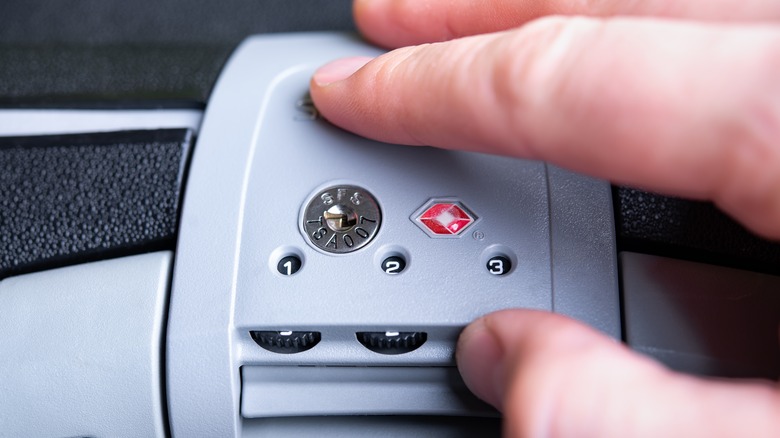The Annoying Reason You May Want To Avoid Wasting Money On 'TSA Approved' Locks
We all know how strict TSA can be with carry-on luggage, but behind the scenes, the agency is scrutinizing your checked baggage, too. According to TSA's website, about 1.3 million checked bags are screened every day in the U.S., and part of this screening can involve physical inspections. TSA-approved locks are recommended for traveler suitcases to simplify this process, though security officers don't actually treat these locks differently than other types.
The concept behind TSA-approved locks is simple: Unlike regular ol' locks, TSA-friendly ones can be unlocked using a universal key that inspectors supposedly keep on hand. That means that TSA can open your luggage if needed without breaking the lock or causing any damage to your bag. Unfortunately, this isn't always the case. The organization has the right to remove or forcibly open any lock that impedes safety screenings.
@travelwiththeharmony TSA Approved Locks are a SCAM ‼️#Travelwiththeharmony
Redditor u/KTeax31875, who purports to be a TSA agent, confirmed this in a Reddit thread, saying, "Sometimes if the master key can't open it, we have no choice but to break it." A former baggage handler who posts under the handle @travelwiththeharmony on TikTok also admitted that agents may cut TSA-approved locks if they can't find the universal key and are short on time.
The locks don't always stop thieves
Another reason why TSA-approved locks could be a waste of money is that besides TSA personnel, ordinary people — or, you know, thieves — could also break into your suitcase. In 2014, the Washington Post published photos of TSA's universal keys on its website, which inadvertently allowed people to 3D-print their own set based on the images. The original photos have since been removed, but the files for the 3D prints remain online.
If your lock comes with a combination, a thief could also crack the code through a few common strategies. For instance, they could simply turn each dial until they click, which will eventually trigger the lock to open. Alternatively, a criminal could use a safety pin or other small object to pick the lock.
Finally, luggage can be broken into even if the zippers remain locked in place. Content creator @millennialwealthsarah demonstrated on TikTok how easily zippers can be punctured using just a pen. And, in many cases, the suitcase can be zipped back up after the thief has pilfered through your stuff, so you won't even suspect any damage has been done until you arrive home.
How to protect your belongings when traveling
There's no need to swear off TSA-approved locks for future trips. Rather, it's good to keep in mind that these protective devices — and any other store-bought ones — aren't foolproof. The best way to protect your prized possessions when traveling is by keeping them in your carry-on bag. Jewelry, electronics, and any items that may be hard to replace (such as prescription medication or a small family heirloom) should be kept with you at all times.
To protect any belongings that must be screened, consider adding some security besides a standard lock. The twist tie hack for securing luggage is one simple way to deter thieves, as are zip ties placed on your zippers. Just like with locks, TSA agents will break the ties if they need to get inside your suitcase, but if you keep a stash of extra ties inside, there's a good chance they'll replace the broken tie for you.
Finally, remember to always pack an extra lock when traveling. If your TSA-approved lock gets cut, it'll be useless during your flight back home. Keeping a spare lock in your bag can give you peace of mind during any future leg of your trip.


